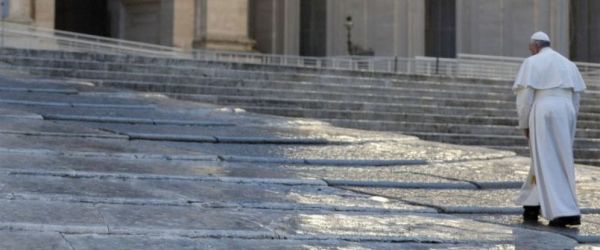“God so loved the world that he gave his only-begotten Son” (Jn 3:16). This is the heart of the Gospel; this is the source of our joy. The Gospel message is not an idea or a doctrine. It is Jesus himself: the Son whom the Father has given us so that we might have life. Jesus is the source of our joy: not some lovely theory about how to find happiness, but the actual experience of being accompanied and loved throughout the journey of life. “God so loved the world that he gave his only-begotten Son”. Brothers and sisters, let us dwell on these two thoughts for a moment: “God so loved” and “God gave”.
First of all, God so loved. Jesus’ words to Nicodemus — a Jewish elder who wanted to know the Master — help us to see the true face of God. He has always looked at us with love, and for the sake of love, he came among us in the flesh of his Son. In Jesus, he went in search of us when we were lost. In Jesus, he came to raise us up when we fell. In Jesus, he wept with us and healed our wounds. In Jesus, he blessed our life forever. The Gospel tells us that whoever believes in him will not perish (ibid.). In Jesus, God spoke the definitive word about our life: you are not lost, you are loved. Loved forever.
If hearing the Gospel and practicing our faith don’t enlarge our hearts and make us grasp the immensity of God’s love — maybe because we prefer a glum, sorrowful and self-absorbed religiosity — then this is a sign that we need to stop and listen once more to the preaching of the Good News. God loves you so much that he gave you his entire life. He is not a god who looks down upon us from on high, indifferent, but a loving Father who becomes part of our history. He is not a god who takes pleasure in the death of sinners, but a Father concerned that that no one be lost. He is not a god who condemns, but a Father who saves us with the comforting embrace of his love.
We now come to the second aspect: God “gave” his Son. Precisely because he loves us so much, God gives himself; he offers us his life. Those who love always go out of themselves. Don’t forget this: those who love go out of themselves. Love always offers itself, gives itself, expends itself. That is the power of love: it shatters the shell of our selfishness, breaks out of our carefully constructed security zones, tears down walls and overcomes fears, so as to give freely of itself. That is what love does: it gives itself. And that is how lovers are: they prefer to risk self-giving over self-preservation. That is why God comes to us: because he “so loved” us. His love is so great that he cannot fail to give himself to us. When the people were attacked by poisonous serpents in the desert, God told Moses to make the bronze serpent. In Jesus, however, exalted on the cross, he himself came to heal us of the venom of death; he became sin to save us from sin. God does not love us in words: he gives us his Son, so that whoever looks at him and believes in him will be saved (cf. Jn 3:14-15).
The more we love, the more we become capable of giving. That is also the key to understanding our life. It is wonderful to meet people who love one another and share their lives in love. We can say about them what we say about God: they so love each other that they give their lives. It is not only what we can make or earn that matters; in the end, it is the love we are able to give.
This is the source of joy! God so loved the world that he gave his Son. Here we see the meaning of the Church’s invitation this Sunday: “Rejoice... Rejoice and be glad, you who mourn: find contentment and consolation” (Entrance Antiphon; cf. Is 66:10-11). I think of what we saw a week ago in Iraq: a people who had suffered so much rejoiced and were glad, thanks to God and his merciful love.
Sometimes we look for joy where it is not to be found: in illusions that vanish, in dreams of glory, in the apparent security of material possessions, in the cult of our image, and in so many other things. But life teaches us that true joy comes from realizing that we are loved gratuitously, knowing that we are not alone, having someone who shares our dreams and who, when we experience shipwreck, is there to help us and lead us to a safe harbor.
[Pope Francis, homily on the occasion of the 500th anniversary of the evangelisation of the Philippines, 14 March 2021]












